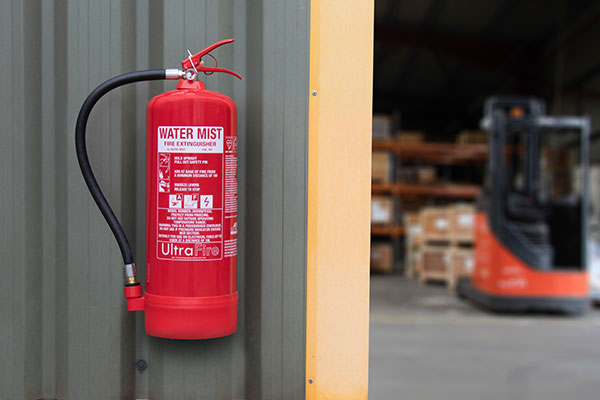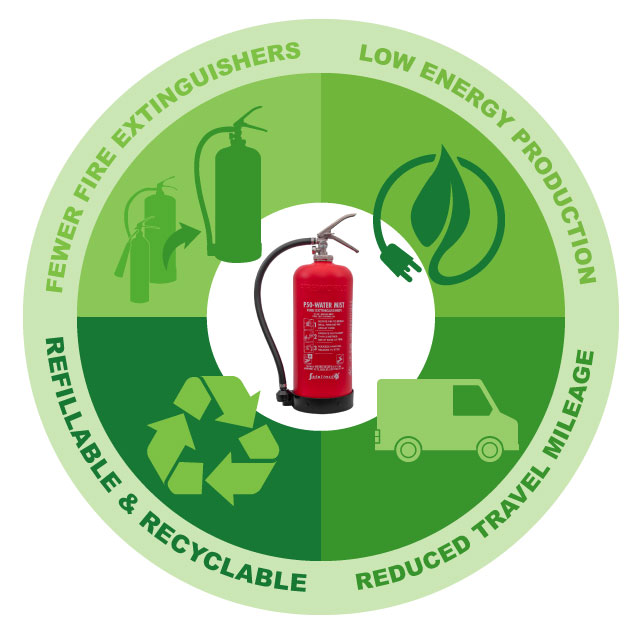Wednesday 8th January 2025
AFFF foam fire extinguishers are commonly found in many premises across the UK including offices, schools, warehouses, shops and public buildings due to their unique fire-fighting capabilities. However, AFFF foam extinguishers contain harmful Perfluoroalkyl and Polyfluoroalkyl Substances (PFAS) chemicals, and as a result, businesses in the UK are now facing increased costs to properly dispose of these extinguishers before tighter restrictions are introduced. The cost to clean up toxic PFAS pollution could top £1.6tn in UK and Europe according to The Guardian. In this blog, we’ll explore why these extinguishers are being phased out, what’s driving up AFFF foam extinguisher disposal costs, and how businesses can switch to safer, eco-friendly alternatives.

Understanding the Environmental Impact of PFAS
PFAS chemicals found in an AFFF foam fire extinguisher are harmful to the environment and living organisms. Toxic PFAS substances enter our ecosystems, accumulating in water, food, and air. These are slow to degrade and are also known as ‘forever chemicals’ meaning they remain in the environment for a long time.
Humans run the risk of increased cholesterol, lowered immune systems, and damage to liver, thyroid and heart if they ingest compounds such as PFOA or PHFxA. PFAS chemicals are also carcinogenic (cancer causing) and can cause irreparable damage to foetuses.
UK Legislation on PFAS Chemicals
Older AFFF foam extinguishers containing PFOA (C8), part of a sub-group of PFAS, have been subject to legislation since 2020 in the UK and EU. There are now calls for action from various bodies for the UK Government to introduce further restrictions on the manufacture, distribution and use of substances containing Poly and Perfluorinated Alkyl Substances (PFAS). At the time of writing, the Poly and Perfluorinated Alkyl Substances (Guidance) Bill has had its first reading in the House of Commons. This bill calls on the Chief Inspector of Drinking Water to issue guidance to water companies on PFAS in drinking water. This follows studies on the prevalence of these chemicals in water courses in the UK.
The HSE has also held a consultation on PFAS earlier in the year and is now considering the results before taking action. The action is expected to result in another 40 PFAS substances being registered with UK Reach for regulations. PFHxA (C6), which is used in newer AFFF foam extinguishers and water additive extinguishers is expected to be amongst this list of substances which will soon be subject to restrictions. This follows a broader global trend, with the European Union leading the charge on PFAS restrictions.
Following the forthcoming announcement of the regulations surrounding the use of PFAS fire-fighting foams, any business that continues to use these extinguishers may risk falling foul of compliance requirements in the future.
Businesses could face increased disposal costs
Beyond regulatory pressures, the cost of managing AFFF foam extinguisher disposal is rising. Earlier this year (March 2024) the price of disposing of AFFF foam fire extinguishers was roughly £2-£3 per unit. In October 2024, prices are £8-£9 per unit.
The safe handling and destruction of PFAS foam is a complex process that few facilities in the UK are equipped to handle. This mean costs are likely to increase further as more organisations begin to phase out their old AFFF foam fire extinguisher models. There are currently only 3 facilities in the UK equipped to deal with disposal and demand is likely to soar when further regulatory measures are announced.
Eco-Friendly Alternatives to AFFF Foam
Businesses are being encouraged to switch to eco-friendly fire extinguisher alternatives, such as fluorine-free foam and water mist. These options provide effective fire protection without the environmental impact associated with older AFFF extinguishers that contain harmful PFAS chemicals.

P50 fire extinguishers are a sustainable fire-fighting choice, offering a low-energy manufacturing process. They are refillable, are manufactured from recyclable materials, and have a corrosion-proof design suitable for harsh outdoor conditions. By switching to P50 fire extinguishers, you will be reducing you carbon footprint and contributing to your environmental initiatives. Organisations who switch to P50 extinguishers also see substantial cost savings over the guaranteed 10-year lifespan.
Read our blog on alternatives to AFFF foam extinguishers for more information.

How to dispose of AFFF foam
AFFF foam fire extinguisher disposal involves high-temperature incineration of the AFFF media. Businesses or organisations should utilise certified disposal services to safely eliminate their AFFF extinguishers, to protect the environment and ensure compliance with UK regulations. As more companies phase out AFFF foam, disposal services will become increasingly expensive and harder to secure (as we’ve already started to see).
Spreading the cost of replacing AFFF foam extinguishers
At Safelincs, we understand that transitioning can seem daunting. As part of our service to help you switch to environmentally friendly alternatives, we will safely and responsibly dispose of your AFFF fire extinguishers. Businesses can start replacing AFFF foam fire extinguishers that have reached the end of their usable life now, and gradually phase out remaining units over time. This approach helps manage costs whilst ensuring compliance and environmental responsibility.
To make the process seamless, we provide free site surveys for P50 fire extinguishers and tailored recommendations for eco-friendly alternatives suited to your fire risks. You can also contact our BDM team if you would like more information about the extinguishers, or the transition.
